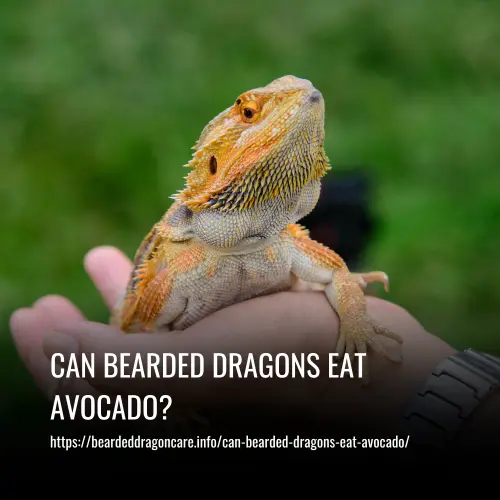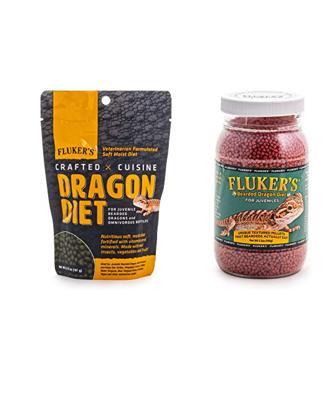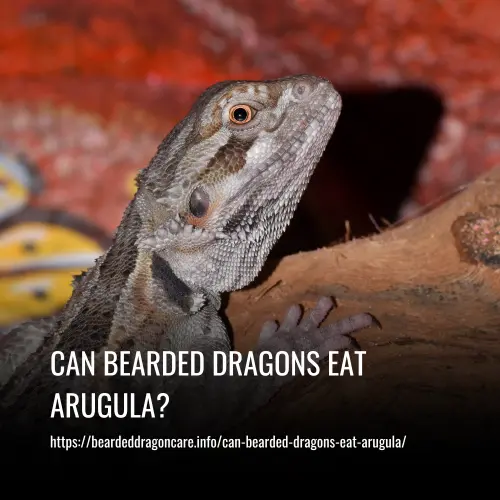Bearded dragons are popular pet reptiles known for their docile nature and unique appearance. To care for a bearded dragon, it is important to understand the selection and safety of nutritious foods. One common question among bearded dragon owners is whether or not they can eat avocados.
In this article, we’ll explore the nutritional value of avocados, the potential risks for bearded dragons, and whether or not it’s safe to include avocados in their diet.

Can Bearded Dragons Eat Avocado
No, Bearded Dragons should not eat avocado because it contains persin, a toxin that can cause vomiting, diarrhea, respiratory failure, and death in animals. Persin is primarily found in the skin and seeds of avocados, and even a small amount in the fruit can be harmful to animals. It’s best to avoid giving your bearded dragon avocado to keep them safe.
Do Avocados Have any Nutritional Value for Bearded Dragons?
Avocados are not good for bearded dragons to eat because they’re toxic and don’t have much nutritional value. Avocados are high in fat, which can upset their digestive system and contribute to obesity, a common problem for captive lizards.
Additionally, avocados contain oxalic acid, which can bind to calcium and prevent the body from absorbing and using this important nutrient. Lack of calcium can result in metabolic bone disease and long-term harm to a bearded dragon’s skeletal structure.
Are Avocados Safe for Bearded Dragons to Eat
No, avocados are not safe for bearded dragons to eat. They contain a toxic fungicide called PERSIN, which is harmful to lizards. Additionally, avocados are high in fat and can lead to obesity, which can cause heart and liver failure.
They also contain oxalic acid, which can cause metabolic bone disease and calcium deficiency in bearded dragons. Finally, unripe avocados can be a choking hazard for beardies. It’s best to avoid feeding avocados to your pet.
Why is Avocado Bad for Bearded Dragons
Avocado is bad for bearded dragons because it is high in fat, with more than 75% of its calorie count coming from fat. This can easily cause obesity in bearded dragons, which can lead to serious health problems. Additionally, avocados are high in oxalic acid, which can bind with calcium and prevent absorption into the bloodstream.
This can cause metabolic bone disease in bearded dragons, which can lead to symptoms like twitching limbs, weakness, bone fractures, and limb paralysis. It’s important for Dragon Keepers to keep their bearded dragons on a balanced diet and in a properly lit terrarium to prevent MBD. If any symptoms are noticed, contact a vet immediately.
The Risks of Feeding Bearded Dragons Avocado
Avocados may seem like a healthy snack for humans, but they can be harmful to your bearded dragon. Here are some reasons why:
1. Oxalic Acids
Avocados contain oxalic acids, which are harmful to your bearded dragon. These acids can cause serious illness or even death if consumed in high amounts. Other foods that contain oxalic acids include cocoa, leafy veggies, and nuts.
2. Binding with Other Minerals
Oxalic acid can bind with minerals and vitamins in your bearded dragon’s body, causing health complications such as kidney stones. The body can naturally eliminate oxalates, but if your pet consumes high amounts of the compound, it may fail to flush it out of the system.
3. Decreases Mineral Absorption
Oxalic acid can prevent bearded dragons from absorbing calcium and other minerals. The condition can result in a compromised immune system and the development of metabolic bone disease (MBD). MBD can cause limb paralysis, shaky limbs, weakness, and bone fractures.
4. Inadequate Calcium to Phosphorous Ratio
Bearded dragons require a specific balance of calcium to phosphorous in their diet. Unfortunately, avocados have a higher amount of phosphorous than calcium, which can lead to a calcium deficiency. This can cause health issues such as metabolic bone disease and weakened bones.
5. Can Lead to Obesity
Avocados are high in fat and calories, which can lead to obesity in bearded dragons. This is especially true if the dragon is in captivity and not getting enough exercise. Obesity is associated with serious health issues like heart disease and liver failure.
For these reasons, it’s best to avoid feeding your bearded dragon avocados. Stick to a balanced diet that includes foods that are high in calcium and low in fat. This will help ensure that your dragon stays healthy and happy.
6. Choking Hazards
Bearded dragons have a unique way of eating since they are unable to chew their food and have to swallow whole pieces. Avocado can be tough and rigid, even when ripe, which can cause choking and potentially lead to suffocation. It is important to avoid feeding your bearded dragon avocado unless it is completely mashed up.
7. Fungicidal Toxins
Avocados contain persins, which are toxic to bearded dragons. These toxins are usually present on the skin and seeds of the fruit and can seep into the flesh. Ingestion of persins can cause a range of symptoms in bearded dragons, including diarrhea, vomiting, respiratory failure, and even death. It is best to avoid feeding your bearded dragon avocado altogether.
What You Should Do If Your Beardy Eats an Avocado
If your lizard friend accidentally eats avocado or its leaves, it’s important to take immediate action to ensure their safety.
1. Call a Vet Immediately
The first step is to call your vet right away. Give information about your pet’s age and how much avocado was consumed. Your vet will determine if emergency medical attention is needed and provide instructions for supportive care or an antidote.
2. Monitor Its Behaviors
Keep a close eye on your lizard friend’s behaviors and look out for any abnormal signs such as respiratory distress, lethargy, restlessness, vomiting, and diarrhea. Other signs of avocado ingestion include dry heaves, increased salivation, and mouth and facial irritation.
If you notice any of these symptoms, report them to your vet and inform them that you are on your way. It’s crucial to act quickly to ensure the best possible outcome for your pet.
3. Warm Bath
Providing a warm bath for a bearded dragon may assist in eliminating toxins from its body. Encourage it to go to the bathroom while in the bath, as this will help flush out any remaining toxins from its system.
4. Plenty of Water
Providing adequate drinking water for pet lizards can aid in the elimination of toxins from their system. As bearded dragons can struggle to drink enough water on their own, use a syringe to help them drink plenty of water to dilute or wash out the poison as quickly as possible.
5. Activated Charcoal
Combine activated charcoal and water, then use a syringe for application. Activated charcoal has the ability to bind toxins within the body, which may assist in their elimination. It’s important to note that activated charcoal should only be given after consulting with a veterinarian, as it may interfere with other medications or treatments.
What Your Bearded Dragon Can Eat Instead of Avocado
Instead of giving your bearded dragon avocado, there are many other fruits that they can eat in moderation. However, it’s important to avoid fruits with a high oxalic acid content, which can strip your beardie of calcium. Kiwis, raspberries, and starfruit should be avoided altogether.
Additionally, highly acidic fruits like oranges, lemons, and grapefruits can upset their digestive tract. Good options include apples, watermelon, papaya, strawberries, blueberries, grapes, figs, dates, peaches, apricots, plums, and pears. Feed your bearded dragon fresh fruit, not dried, and limit it to only 5% to 10% of their diet.
FAQs
Are Avocados Toxic to Bearded Dragons?
Avocados contain persin, a toxic element that can be harmful to many animals, so it is not recommended for bearded dragons to consume them. Persin is concentrated in the skin and seed of the avocado, but it can also seep into the meat of the fruit. Ingesting avocado can cause vomiting and diarrhea in bearded dragons, which can lead to dehydration.
If the persin is not expelled from their body, it can affect their respiratory system and even lead to death within a few hours of ingestion. It’s important to avoid feeding your bearded dragon any avocado to keep them safe and healthy.
What Happens When a Bearded Dragon Eats Avocado?
Avocado is toxic to bearded dragons, so they should not eat it. If they do eat it, they may experience vomiting and diarrhea as their body tries to expel the toxin. If the avocado is not expelled quickly enough, it can start to affect their respiratory system and lead to difficulty breathing. This can result in death within a few hours.
What To Do If My Bearded Dragon Eats Avocado?
If your bearded dragon accidentally eats an avocado, it’s important to act quickly. Call your vet right away and watch for any signs of respiratory distress in your pet. Try giving your dragon a warm bath to encourage them to go to the bathroom and get the avocado out of their system. Use a syringe to give your dragon lots of water to wash out the poison as quickly as possible. Remember to stay calm and take action as soon as possible.
Can I Feed my Bearded Dragon Avocado if it’s Cooked?
Don’t feed Bearded Dragons cooked avocado. Cooking doesn’t eliminate Persin, which can harm your bearded dragon. It’s best to avoid avocado altogether when it comes to feeding your bearded dragon.
Conclusion
In conclusion, while avocados may seem like a healthy option for your bearded dragon, it’s best to avoid feeding them this fruit altogether. Stick to a balanced diet of insects, vegetables, and fruits that are safe for your pet to consume. Keeping your bearded dragon healthy and happy is key, so always do your research before introducing new foods into their diet.

